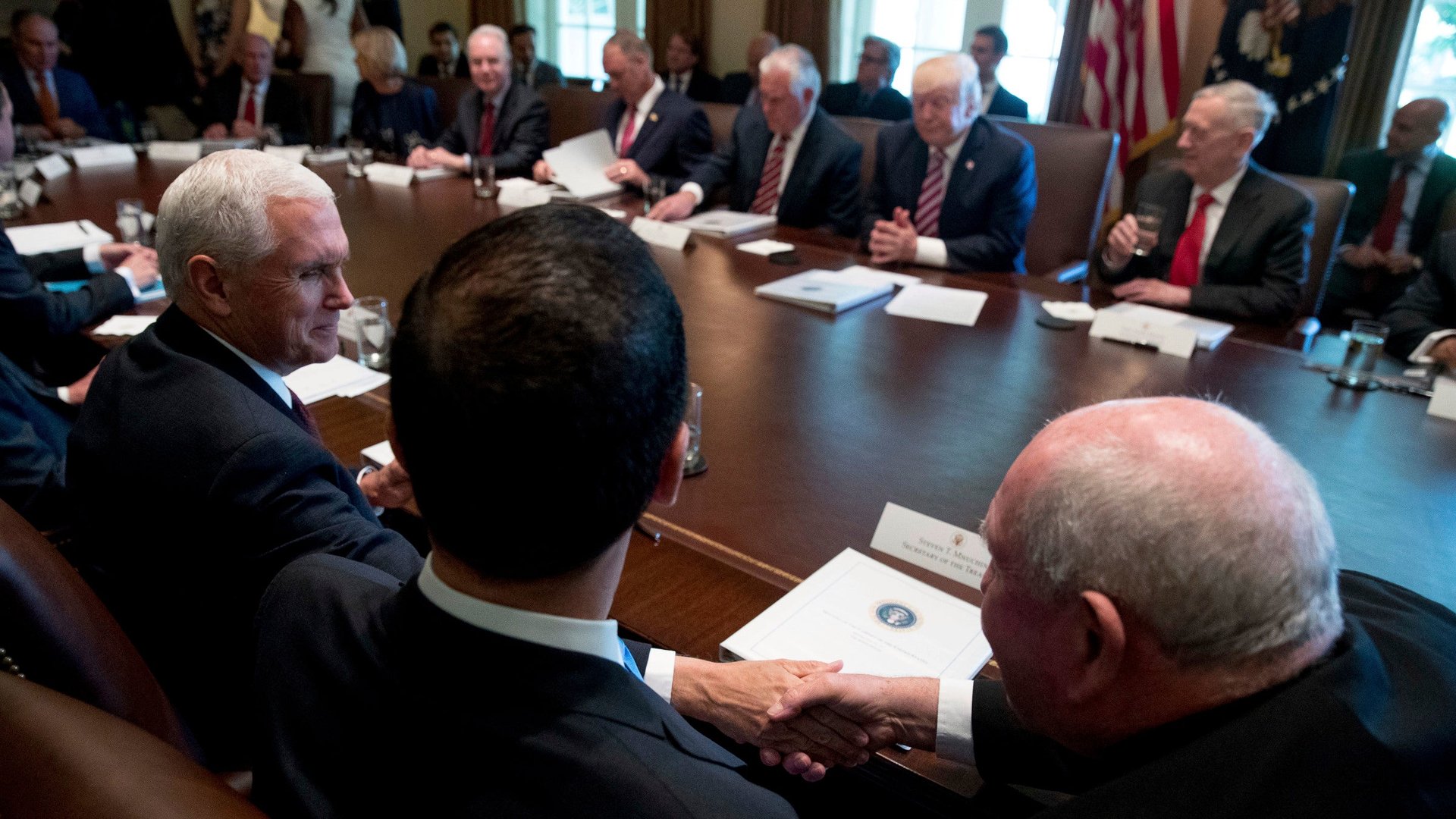The Republican health-care bill means windfall profits for Trump’s billionaire cabinet and other rich people
As we’ve written, the health-care bill currently before the US Senate transfers money from health coverage for millions of poor Americans to tax cuts for the wealthiest. But what’s been less noticed is that it does so retroactively. And that’s going to be rather nice for some people close to a certain president Donald Trump.


As we’ve written, the health-care bill currently before the US Senate transfers money from health coverage for millions of poor Americans to tax cuts for the wealthiest. But what’s been less noticed is that it does so retroactively. And that’s going to be rather nice for some people close to a certain president Donald Trump.
The bill eliminates a 3.8% tax on investment income for Americans who earn more than $200,000 annually. That tax was enacted in 2010 under president Barack Obama to cover the costs of the health-coverage expansion that the Republicans are now working to repeal.
Their argument is that removing the tax would help increase investment in the US economy. It’s not clear that this is necessarily true; current maximum capital gains taxes are still historically low, below those imposed by Ronald Reagan’s tax reform in the 1980s and those in effect during the peak of US economic growth following World War II, albeit higher than under George W. Bush.
But what makes the tax cut fishy is that it will apply to any capital gains garnered in 2017, too. Why is that fishy? Because the spending cuts envisioned in the Senate bill won’t go into effect for several years. So cutting taxes starting this year will, despite the Republicans’ invocation of fiscal prudence, mean more government borrowing. And, since even the rich don’t have access to time machines yet, a retroactive tax cut won’t allow them to go back to the beginning of 2017 and decide to invest more to goose the economy.
One way to understand who this will affect is to look at some of the billionaires serving on Trump’s cabinet. Trump installed several appointees to regulate industries in which they did business before, and who needed to sell investments that could pose conflicts of interest. Federal officials appointed by the president are allowed to defer capital-gains taxes on any divested income if they put it into low-risk government bonds, and Trump’s appointees may be taking advantage of that rule. But those taxes will still need to be paid eventually.
For example, Treasury secretary Steve Mnuchin, a banker and investor, needed to sell some 43 investments (pdf) in companies ranging from Goldman Sachs to Verizon. According to transaction disclosures filed this year, Mnuchin has sold between $73 million and $303 million worth of assets to comply with this agreement. (The disclosures require one only to state a range of values for an asset, but even the maximum likely undercounts.) For every million dollars of that accounted as profit, then, a 3.8% reduction in the capital-gains tax could be worth between $38,000.
Another case is Education secretary Betsy Devos. Devos, born into one family of billionaires and married into another, said she would sell 102 different investments within 90 days (pdf) of her Feb. 7 confirmation. It appears she has yet to complete this process, since the Office of Government Ethics has not certified her divestment and the transaction disclosures posted on the website do not list all of the divestable assets discussed in her ethics agreement. Still, she has sold some of them, according to the disclosures, valued between $52 million and $54 million. If she earned a fairly conservative 5% return on those investments, the Republican legislation would take $95,000 from her tax bill.
Keep in mind that the average senator in the United States is a millionaire, and you get the idea of what kinds of personal incentives come into play behind the public-policy interests. Trump’s pick for secretary of Health and Human Services, Tom Price, was a Republican member of Congress before stepping into his cabinet job. During his confirmation, it was reported that he is under investigation after purchasing stock in a biotech company only available to a small group of insiders and then working on legislation that would directly affect the company. Another report showed that he purchased $90,000 in pharmaceutical securities before lobbying the executive branch to block a rule that would have hurt those companies earnings.
Price divested himself of his conflicted holdings in a series of sales following his confirmation, earning between $317,000 and $1.1 million. Should the Republican cuts pass, the 3.8% tax reduction will be applied to the gains from his congressional stock trading. According to disclosures, his profits on the biotech stock imply tax savings between $5,889 and $18,619 thanks to the Republican health care legislation.
“I love all people, rich or poor,” Trump said at a campaign rally on June 21, discussing his appointees. “But in those particular positions I just don’t want a poor person. Does that make sense?”
It certainly makes sense that those people would do their best to deliver tax cuts to the wealthy.
Correction: An earlier version of this story used an incorrect method to account for capital gains, and has been updated with a more accurate estimate.